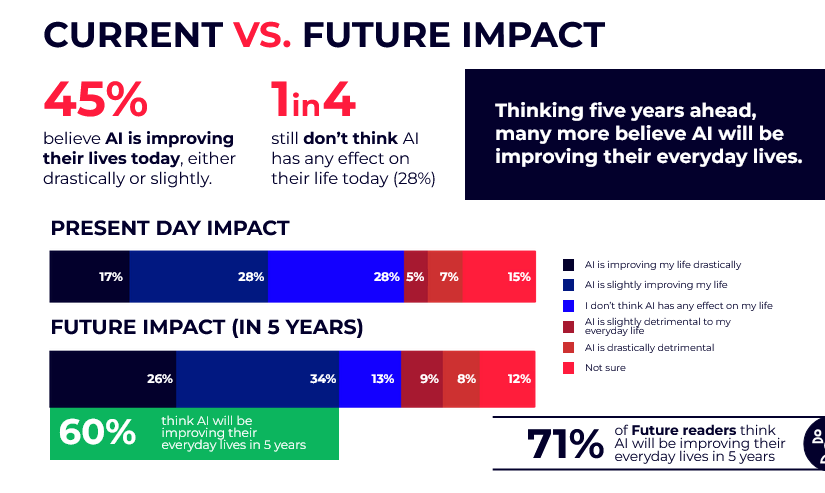Survey shows AI is the last thing considered before a purchase, but that's poised for major change
Most consumers have heard of AI tools, but haven't used any yet

Sign up for breaking news, reviews, opinion, top tech deals, and more.
You are now subscribed
Your newsletter sign-up was successful
If you believe many recent advertising campaigns, artificial intelligence is everywhere and taking over consumer products. But while more people than ever are aware of AI products like ChatGPT, that doesn’t mean they’ve tried any out or that it affects their purchasing choices.
At least, that’s according to a recent survey from Future (TR's parent company) called Demystifying AI. The study, conducted in June, asked a wide range of people about their perception of AI, how they envision using it, and what it means for their buying habits.
Actually, it’s more about what AI doesn’t mean for what people buy. The survey found that, when it comes to buying new tech products, AI is currently dead last for reasons to purchase or decide against doing so. This might come as a surprise, given the rapid integration of AI across the board (with varying degrees of honesty). Nonetheless, brand recognition is the top consideration, with price and operating system filling out the upper ranks of reasons. Regardless of its growing presence in marketing materials, AI barely factors into a consumer’s thinking, if it even comes up.
That doesn’t mean people aren’t interested in AI as a concept. Just that being intrigued by AI doesn’t translate to opening their wallet. People may think of AI as a novelty rather than an essential feature that adds tangible value to their lives. Many of those taking the survey associated AI with terms like “futuristic,” “cool,” and “exciting,” suggesting they want to explore AI. About half, 53%, of respondents said they would be more likely to purchase a product if it was advertised as “AI-enabled.”
That said, many consumers mentioned less positive adjectives for AI, like “expensive” and “concerning.” Over half of the respondents indicated that they believe AI currently has no impact on their lives or is even detrimental. These apprehensions are likely tied to ongoing debates about data privacy, ethics, and perhaps an AI apocalypse.

AI Future Buy
However, just because AI is not a big deal, one way or another, for consumers right now doesn't mean it will never be. There is a notable shift in the survey from how consumers imagine AI in their lives now versus how they expect AI to impact their lives in the future. The 45% of respondents who believe AI is currently improving their lives rises to 60% who think it will do so in the next five years. This optimism suggests that AI advertising is simply premature rather than totally misplaced.
The growing interest in and positive outlook on AI’s future impact offer companies a promising avenue for pushing AI-related projects. But, it may take some effort to educate consumers about the practical benefits of AI first instead of simply touting the technology itself. Future plans include redoing the survey regularly with the same respondents, so we will have to see if the current views evolve along with AI.
Sign up for breaking news, reviews, opinion, top tech deals, and more.
You Might Also Like
- Survey says AI is more buzzkill than buzzword for marketing
- Survey says most believe generative AI is conscious, which may prove it's good at making us hallucinate, too
- Survey finds most people would rather switch companies than deal with AI customer service

Eric Hal Schwartz is a freelance writer for TechRadar with more than 15 years of experience covering the intersection of the world and technology. For the last five years, he served as head writer for Voicebot.ai and was on the leading edge of reporting on generative AI and large language models. He's since become an expert on the products of generative AI models, such as OpenAI’s ChatGPT, Anthropic’s Claude, Google Gemini, and every other synthetic media tool. His experience runs the gamut of media, including print, digital, broadcast, and live events. Now, he's continuing to tell the stories people want and need to hear about the rapidly evolving AI space and its impact on their lives. Eric is based in New York City.